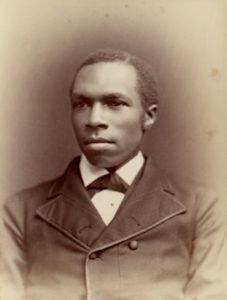
Inman Page
Inman Edward Page was born on this date in 1853. He was a Black educator and academic administrator.
Page was born in Warrenton, Virginia. His parents were slaves on a Virginia plantation. However, accounts vary slightly; when Page was ten years old and a houseboy on the plantation, he and his parents ran through Union lines while North and South soldiers were in the area. The family later moved to Washington, D.C. In the nation's capital, Page attended a private school while earning money as an errand boy. He later spent two years at what is now Howard University. Page was among the first Black students admitted to Brown University; he and classmate George Washington Milford were the first two Black graduates in the same year. Milton went on to become a lawyer.
Page, who was class valedictorian, was selected as the class orator for the 1877 commencement. A white man who heard the speech persuaded Page to accept a teaching position at Natchez Seminary in Mississippi. That marked the first in a series of increasingly distinguished educational successes. Page became president of Langston University in Oklahoma for 17 years. He also was president of the Western Baptist College in Macon, Missouri, and of Roger Williams University in Nashville.
In 1918, Brown bestowed upon him an honorary master's degree. Those who knew Page described him as "tall and strong in body" and brilliant in mind, a Black who worked for the noble achievements of others of his race. Later, he was appointed supervising principal of Oklahoma City's separate school system, where he stayed for 12 years. About a year before he died, in 1935, he was named principal emeritus in honor of his outstanding contributions to the city's school system. Page's death at age 82 in the home of his daughter, Zelia N. Breaux, in Oklahoma City, made banner headlines.
Hundreds of friends, colleagues, and relatives attended his funeral in Oklahoma City. Later, hundreds of others waited "in the stiff, cold north wind" for his burial on Langston University's campus. After his death, one newspaper editorial wrote: "Old Man Ike," as his pupils endearingly referred to him, "was a terror to the disobedient and the mischievous, not because of cruel penalties visited upon them but because students abhorred the thought of their idol knowing of their delinquency."
This peculiar hold that he had upon youth wove virtue and strength of character out of the fabric of their lives.
Black Leaders of the Nineteenth Century.
Edited by Leon Litwack and August Meier
Copyright 1998, University if Illinois Press
ISBN 0-252-06213-2